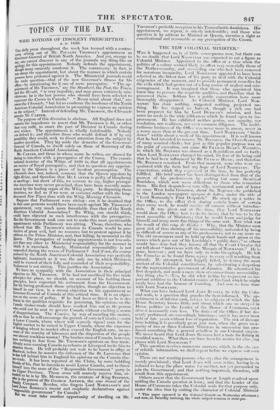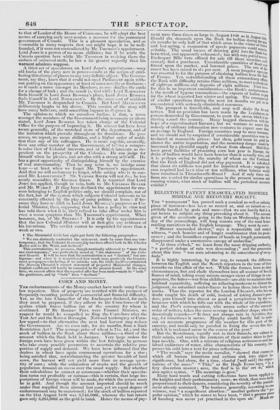THE NEW COLONIAL MINISTER.' " WHY it happened so, is of
little consequence now, but there can be no doubt that Lord NORM txmmTww«s expected to cut a figure as Colonial Minister. Appointed to the office at a time when the politics of a colony seemed likely to affect very materially those of the 1Mother-country, and succeeding one who had been removed fbr notorious incapacity, Lord NORMA N DI appeared to have been
selected as the fittest man of his party to deal with the Colonial exigencies of the moment, and to provide permanent remedies for the evils which had grown out of a long course of neglect and mis- management. It was imagined that those who appointed him knew him to possess the requisite qualities, and therefore that he possessed them. Seldom hats a public expectation been more
thoroughly disappointed. As Colonial Minister, Lord Neil, MANI) Y has done nothing, suggested nothing, projected no- thing. lie has reaped no harvest, though a rich one had been prepared for him by Lord Duals% si's mission, and has sown no seeds in the wide wilderness which he found open to im- provement. He has exhibited neither genius, nor sagacity, nor resolution, nor readiness, nor even common diligence. The multi- tudinous business of the Office was never more in arrear, never in a worse mess than at. the present time. Lord NORMANDY " broke down" within about a week of his appointment. It is well known that he had intended to remove r. STEPHEN, the Over-Secretary of many nominal chiefs ; but just as this popular purpose was on the point of execution, out came Sir FasNcis Ihmsn's Nurratire, in which Mr. STEP EN NV:14 abused as a Republican and so troth; when Lord NORMANDY changed his mind, for fear of its being said that he had been influenced by Sir Fes-sts Ihman ; and therefore Mr. STEPHEN remained. From that moment, none who were ac- quainted with the filets had any hope of Lord NORMANDY. The expectations which they eNpro.sod at the time, he has perfectly fulfilled. His brief career lee; been distinguished from that of the poorest of his predecessors by nothing but some theatrical flourishes, which now seem ridiculous to those who remember them. His first despatell—a very silly, seutimental sort of letter to some West India Governor, about the Negroes—he published in the London newspapers apropos de boars, under the title of " Lord Normanby's First Despatch." lie stuck up a notice in the Office, to the effect that. during certain hours of certain clays every week, he would receive all comers without introduc- tion. It was given out at the time, that Lord NortmANny would show the Office how to do bu.,iness; that he \vas to be the most accessible of ',Ministers; that he would learn and judge for himself, and many more fine things of the saute sort. Now what was the result of this coup de than ? Why, that the Minister soon grew sick of thus showing off his accessibility, and ended by being as difficult of access as any 01' his predecessors, not to say more so. The old messengers used to hold up their hands and groan at the scenes wlsich grew out of his Lordship's " public days ;" as others world have done had they known all that the Court Circular did not tell about. "interviews with the Marquis of Noasissaiy." He in gone, however ; and we have only to write his epitaph. lle left the Canadas as he found them, a prey to every evil resulting from misrule. Ile attempted, but happily tidied, to destroy the utmost ancient. of the Colonial constitutions, by substituting a despotism for the representative government of Jamaica. lle advertised his first despatch, and made a mere show ofextraordivary accessibility. Any thing else ?—Yes, he did what in limo lay to prevent an im- portant addition to the Colonial empire of Emland, which he might easily have had the honour of fimmling. Amid now we have done with Lord NOR MANDY.
What can have induced Lord Jon N RUSSELL to take the Colo- nial seals, is a question that puzzles the best-informed. The ap- pointment is of infisrior rank, relates to subjects of which the late Home Secretary knows little, and about which one so steeped in Home politics as the Leader of the Ibmse of Commons, must alnio4 necessarily care less. The duties of the Office, if but de- cently perfbrmed, arc exceedingly laborious ; and it has never been held of late years without loss of' reputathm. The risk of damage front holding it is peculiarly great just now, when the gross inca- pacity of two or three Colonial Ministers in succession has pro- duced something like a general rebellion in our Colonial empire. We never heard that Lord Joirs Russm.I, had a taste fits fishing in troubled waters. What then can have been his motive for chal;:sing places with Lord NORMANDY ?
This question receives numerous answers, which, in the absmee of reliable information, we shall repeat before we express our own opinion.
There are not wanting persons who say, that the arrangement is merely provisional ; that Lord ;Tons will soon retire, having been induced to keep the place 'myosin tsar another, not yet persuaded to join the Government; and that nothing important, therefore, will result from this appointment.
Others assert that the Government has at length resolved upon settling the Canada question at least ; and that the Leader of the House of Commons takes the Colonial seals for that purpose only, under the idea that by uniting the character of Colonial Minister
• This paper appeared in the Colonial Gazette on Wednesday afternoon; and now, on Saturday morning, the whole subject remaius in statuquo. to that of Leader of the House of Commons, he will adopt the best means of carrying early next session a measure for the permanent government of Canada. This is a pleasant speculation, and so reasonable in many respects that one might hope it to be well- founded, if it were not contradicted by Mr. THOMSON'S appointment. Lord JOHN is a person of no mean abilities ; but it' he settle the Canada question here while Mr. Tilosisosr is reviving there the embers of universal strife, Ile has a far greater capacity than his warmest admirers suppose. A third set of speculators on Lord Joits's appointment—wary old hacks of the party now in power—smile at the notion of attri- buting this change of places to any very definite object. The Govern- ment, say they, knew that it could not meet Parliament again with- out putting on the appearance at least of some novelty or freshness : so it made a move amongst its Members, as one ahuilles the cards for a change of luck ; and the result is, that Nintmarsay finds himself in Lord JOHN Resarme's place, Lord Jons Russierm finds himself in Lord NOItM,1NuY's. By the same sort of accident Mr. Tnomsox is despatched to Canada. lint Lord Mmarovaxis deliberately laughs in his sleeve. This version of the story will have many believers, until something happen to di 3prove it. The opinion to which we ourselves incline, is that, a move amongst the members of the Government being necessary as above stated, Lord JOHN Ressear, has taken charge of the Colonial Office for the purpose of improving it. He cannot but have been aware generally, of the wretched state of the deportment, and of the irritation which prevails _throughout its dominions. Ile pos- sesses, we repeat, no mean abilities, and a higher order of ambi- tion than any of his colleagues. Ile is more capable, assuredly, than any other member of the Government, of ta%intt a compre- hensive view of Colonial interests, and of British interests as de- pendent on the prosperity of the Colonica. lie can judge for himself when he pleases, and act also with a strong self-will. Ile has a great opportunity of distinguishing himself by the exercise of real statesmanship. That he may seize it, we indulge some hope — at least when we forget Mr. TuoMsox's appointment. And that we will endeavour to forget, while asking who is to suc- ceed Mr. LABOITCUERE ? firr. VERNON SMITH will not do ; he too nearly resembles Sir Gi:oeur, GREY. It is reported that Lord JOHN has applied, though in vain, both to Mr. CHARLES BULLER and Mr. NVARD.t It' they have declined the appointment for rea- sons belonging to English politics only, we should complain, not of the filet, but of the system which subjects Colonial interests to be constantly affected by the play of party politics at home : if be- cause they have im Nth in Lord JOHN RUSSELL'S ,purposes as Co- lonial Minister, then, supposing that he has a policy in view and has told them what it is, their refusal to take office under him is even a worse symptom than Mr. THOMSON'S appointment. What becomes„ too, of Mr. STEPHEN ? It is only by his appointments that the new Colonial Minister will at first give any evidence of his intentions. The verdict cannot be suspended for more than a week or two.
t The Ministerial Gig& last night put forth the following paragraph—' " We can distinctly contradict the statement, made by more than one con- temporary, that the Colonial Secretaryship has been offered both to Mr. Charles Buller anvil to Mr. Ward, and deetinelf."
This contradiction, we presume, though nominally addressed to "more than one contemporary," was particularly aimed at " the statement " of the Colo- nial Gazelle. It will be seen that the contradiction is not " distinct," but am- biguous : and when it is remembered how much more positively the Govern- ment newspapers—including, it' we mistake not, the Globe itself—contradicted the Morning Chronirle'ft correct statement of projected Ministerial changes, implicit confidence will hardly be conceded to the present denial. At the same time, we cannot affirm that the reported offer has been made—made to " both" the gentlemen, and by " both" been " declined."



























 Previous page
Previous page